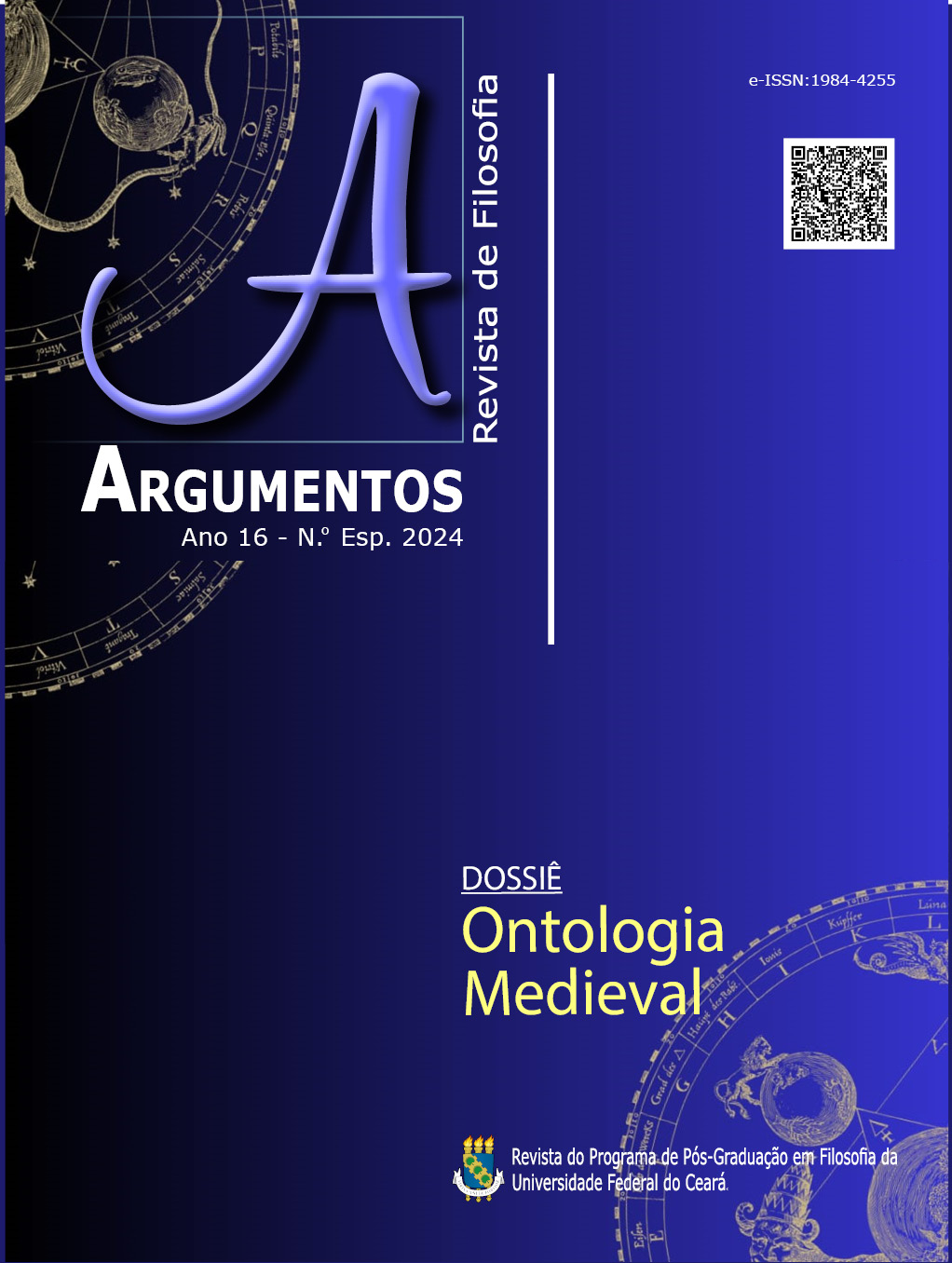Topical aspects from the equivalence between God, good and happiness in Boethius
Keywords:
Boethius. Consolation of Philosophy. Happiness.Abstract
The Consolation of Philosophy is written with an abundance of references to authorities and of interpretations about philosophical ideas by these authors. Boethius’s last work shows us his own idea of philosophy itself as well as his reading on specific theories, such as topical inferences. Our goal here is to show some of the arguments developed through Consolation’s Books III and IV, from which we argue that Boethius presents an equivalence of true good, true happiness and God. It is from these Books that we argue about Boethius’s use of topical arguments in this work.
References
ANGIONI, L. Defining Topics in Aristotle’s Topics VI. Philosophos, Goiânia, v. 19, n. 2, p. 151-193, 2014.
BIRD, O. The formalizing of the topics in mediaeval logic. Notre Dame Journal of Formal Logic. Durham, v. 1, n. 4, 1960, p. 138-149.
BIRD, O. The Tradition of the Logical Topics: Aristotle to Ockham. Journal of the History of Ideas, v. 23, n. 3, 1962, p. 307-323.
BOÉCIO. A Consolação da Filosofia. Campinas: Vide Editorial, 2023.
BOETHIUS. Consolatio Philosophiea (Edição e comentário: O’DONNEL, J. J.). 1990.
BOETHIUS. De topicis differentiis. In.: Boethius’s De topicis differentiis. Ithaca: Cornell University Press, 1978.
BOETHIUS. In Ciceronis topica. In.: Boethius’s In Ciceronis topica: an annotated translation of a medieval dialectical text. Ithaca: Cornell University Press, 1988.
BOETHIUS. The Consolation of Philosophy. Indianapolis: Hackett Publishing Company, 2001.
BOETHIUS. Theological Tractates. The Consolation of Philosophy. London: Harvard University Press, 1973.
CASEY, J. P. Boethius’s Works on Logic in the Middle Ages. In: KAYLOR, N. H.; PHILIPS, P. E (Eds.). A Companion to Boethius in the Middle Ages. Danvers: Brill, 2012. p. 193-220.
DE LIBERA, A. A Filosofia Medieval. Rio de Janeiro: Jorge Zahar Editor, 1998.
DUNCOMBE, M.; NOVAES, C. D. Dialectic and logic in Aristotle and his tradition. History and Philosophy of Logic, v. 37, 2016, p. 1-9.
STUMP, E. Dialetic and its place in the Development of Medieval Logic. New York: Cornell University Press, 1989.
STUMP, E. Notes to Book II. Boethius’s De topicis differentiis. Ithaca: Cornell University Press, 1978. p. 110-128.
STUMP, E. Differentia and the Porphyrian Tree. In.: STUMP, E. De topicis differentiis, Ithaca: Cornell University Press, 1978a, p. 236-247.
Downloads
Published
Issue
Section
License
Copyright (c) 2024 Luana Talita da Cruz

This work is licensed under a Creative Commons Attribution 4.0 International License.
Argumentos magazine is licensed under an International Creative Commons Attribution License.
The Magazine uses CC BY inclusion
1) The authors retain the copyright granted to the magazine or the right to initial publication, with the work regularly licensed under the Creative Commons Attribution, which allows the sharing of the work with acknowledgment of authorship and initial publication in this magazine.
2) The authors are authorized to contract additional applicable contracts, for non-exclusive distribution of the version of the work published in this journal (for example, publication in the institutional repository or as a chapter of the book), recognition of authorship and initial publication in this journal.
3) Authors are authorized and encourage to publish and distribute their work online (for example, in institutional repositories or on their personal pages) at any time before or during the editorial process, as they can generate productive changes, as well as increase the impact and reference of published work.




.jpg)










._._3.png)
1.jpg)
._._._.png)
